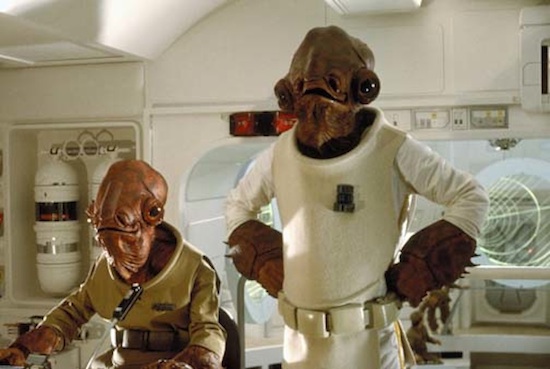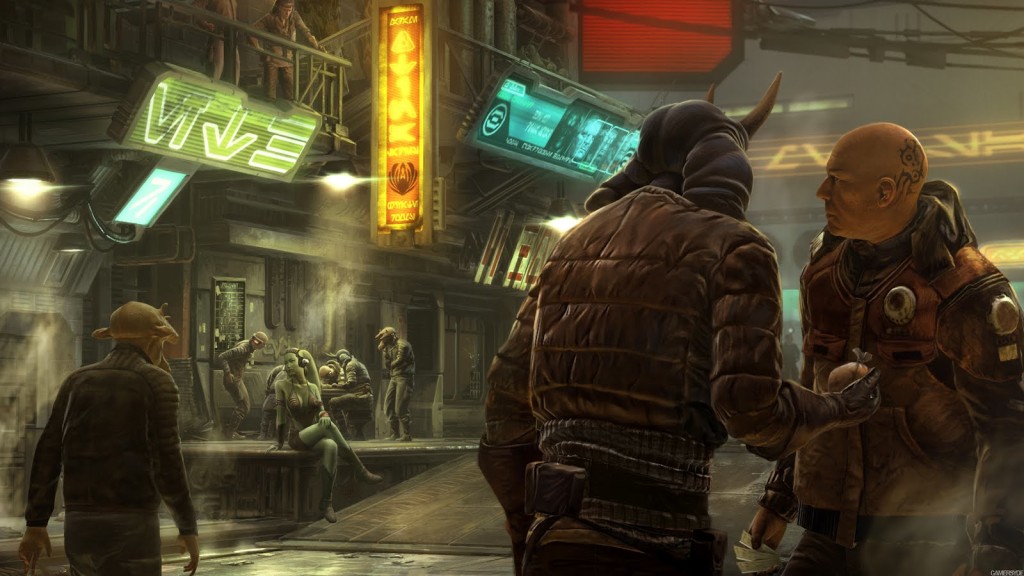Last year, in anticipation of the upcoming Star Wars films, I invited anyone who wanted to send in their own Star Wars script to do so. I would review the Top 5, and if one was really awesome, who knows, Disney might see it and get the writer involved in a future installment of the series. I received 20 Star Wars scripts in total. This week, I will review the best of those. Monday we got Old Weapons. Yesterday we had rising shadows. Today we have the most badass lobster in the galaxy!
Genre: Sci-fi
Premise: (from me) Months after the Empire has been torn down, Admiral Ackbar and a small derelict crew chase after the last Star Destroyer, which harbors an opportunistic commander who may or may not have ties to the Force.
About: This is actually the first script I’ve received from Scott F. Butler, so I don’t know much about him other than he really likes Admiral Ackbar!
Writer: Scott F. Butler
Details: 124 pages
In the name of Salacious Crumb, I don’t know if Star Wars Week is going to survive past today. I’m getting a lot of e-mails from people excited I’m doing it, but not a lot of those people seem to be participating in the discussion. In a half-stolen line from one of the commenters, the comments section for this week is starting to look like the Dune Sea.
With that in mind, I had to make a hard decision on which Star Wars script would be the last. I couldn’t make it through another 150+ page script, so that eliminated Children of the Jedi. I liked that someone would tackle an Emperor origin story. But Holy schnikees, the first five pages are all description! Not even action description. Just description.
That left me with The Admiral’s Vendetta versus Secrets of the Ancients. Admiral’s Vendetta got a little more love in the Group Posting on Saturday, so I decided to go with that.
Strangely, our author has decided to title this episode “Episode 6.5.” I found that odd, since it relegates the script to “never having a chance” status (who’s going to spend 200 million dollars on a half-sequel?). Then again, since Disney has already mapped out an outline for the next three films, none of this week’s scripts had a shot at a direct translation anyway. It was more about finding a writer who could nail a Star Wars story and getting them noticed.
So “Vendetta” takes place six months after Return of the Jedi. The Rebels are trying to clean up the galaxy, and Admiral Ackbar (that iconic lobster looking dude with the awesome voice) has spotted the last of the Star Destroyers trying to get away. He wants to bring in the ship’s commander and, not unlike they did with all those Nazis, make him pay for his war crimes.
The commander in question is a dude named Ti Treedum, who seems to have a little of the Force in him. Treedum is actually a pretty interesting guy. He never saw eye-to-eye with the Emperor, but he doesn’t like the Rebels either. He sort of wants to start his own government, and to do that, he needs to learn how to become a Jedi, something he can accomplish with the help of one the Emperor’s Imperial Guards.
So he and this guard head out to meet up with another bad guy who, I believe, is going to help Treedum get his Jedi schwerve on. Admiral Ackbar is so set on making sure this doesn’t happen, however, he eschews the red tape that would prevent him from following them and goes rogue, teaming up with an upstart pilot named Lanza, and a pirate named Kara Kara.
They take the WA-77 pirate ship (piloted by a humanoid lizard named Slay who speaks in slithers) and are finally able to catch up to Treedum and his Imperial Guard pal. It’s there where Ackbar demands that Treedum turn himself in, but as you might imagine, Treedum has other plans. A battle ensues, which will end with the future of the galaxy in doubt!
The Admiral’s Vendetta felt like one of those scripts with good intentions that hadn’t figured itself out yet. And a Star Wars movie is not the kind of movie that works un-figured-out. There are so many aliens and so many planets and so much exposition and so many storylines, that if you’re not on top of your game and telling a confident story every step of the way, the story can quickly get away from you.
This happens with any complicated story really. For complicated stories to work, you need to workshop them. You need to give them to people after every draft and see if what you’re trying to do is making sense, if it’s all followable. One wonky or confusing plotline can doom a script. Which is why, I’m realizing, writing these Star Wars scripts is so hard.
For example, I didn’t understand what Ti Treedum was really. Was he a Jedi? Or just someone who wanted to be a Jedi? In one scene he’s able to use his force-powers to choke Lanza. In the next, he’s baffled about lightsabers. That’s fine if he’s an apprentice, someone with Jedi powers who’s trying to learn to become a Jedi (or a Sith) but that needs to be made clear somewhere.
See, with every unclear plot point, there are repercussions, “cracks” if you will, that spread out throughout the rest of the script. Because I wasn’t sure if Treedum was a Jedi, I wasn’t sure what he was trying to do. And because I didn’t know what he was trying to do, I didn’t know why it was so important for Ackbar to get him. This entire script is based on Ackbar’s need to capture Treedum at all costs. But if Treedum’s just some bumbling wannabe-Jedi, who cares? How much damage can he really do?
And that was “Vendetta’s” biggest mistake. The stakes weren’t very high (or clear for that matter). What happens if we stop Treedum? Nothing, really. We stop some unclear future problem. In Star Wars, we’re trying to stop the most technologically advanced weapon in the universe. Those are stakes. Had, for instance, we been told that Treedum was a super badass with the ability to raise armies and take over the galaxy, I would’ve been more invested in stopping him.
On top of that, there were too many meandering sequences in the story. Remember, sequences in action movies are about setting a goal, stakes, and adding urgency. They’re little mini-movies that need to be clear. In the original film, our characters get stuck in a Death Star. It’s clear their goal is to get out. That the stakes are they’ll die (along with many others). And the urgency is that someone’s always on their tail.
When we finally get to Treedum’s ship, there’s this overlong sequence where we’re just sitting around with the two ships (good guys and bad guys) talking to each other. “You surrender.” “No, I don’t want to.” It felt like a petty fight between five year olds. This is Star Wars. There should be no ships talking to each other through video-links. People need to board ships, to go after people, to get into some conflict!
And when conflict did finally arrive, it dipped up and down in waves. A sequence has to build up to a climax (again, our characters in the Death Star – they’re building towards getting out – the climax occurs when they make their run for it). There was no build here. It was, again, a lot of back and forth, as if Scott wasn’t quite sure if, or when, he should pull the trigger.
That might be the best way to describe “Vendetta.” The script always felt like it was holding back. It never had its “stuck in a trash compactor” moment. The conflict was only half-realized. I wanted these characters to engage, but it seemed like they were more interested in talking about engaging.
That’s not to say the script didn’t have its moments. It was probably the most creative of the bunch. The half-underwater city of Dac was really cool. And the port city with all the pirates where they had to find a ship, although an obvious reference to Tatooine, felt like its own unique world, which is what I’ve been looking for with these scripts.
I liked the Skull ship, the triple light speed jump, and Kara Kara and Slay. Making her the female Han Solo was a nice touch, since it’s impossible to create another Han Solo in the Star Wars universe without it looking like you’re directly ripping off Han Solo. Kara Kara felt like her own person. And that was good. But man, I wish this story had more bite!
You know I worried, at first, that there would be no true screenwriting lessons to come out of this week. That the only things we’d be able to learn were Star Wars specific (a sexualized teenaged lesbian relationship at the core of a Star Wars film probably isn’t the best way to go). But now that I think about it, I realize that every writer is dealing with the exact same issues these Star Wars writers are dealing with.
Whatever genre you like to write in, that genre is your “Star Wars.” Just like that iconic film, your genre has done everything already. Just like these Star Wars writers can either write clones of their favorite Star Wars films or push the franchise into new territory, you can either write clones of your favorite genre films or push into new territory.
It isn’t easy to do, to “try.” It’s so much easier to fall back on what’s been done before because it doesn’t take any thinking on your part. But if you do go that extra mile and seek out those new ideas, and you do that consistently throughout your script, I guarantee you, you’re going to write something that readers and audiences remember.
Script link: Star Wars: The Admiral’s Vendetta
[ ] what the hell did I just read?
[x] wasn’t for me
[ ] worth the read
[ ] impressive
[ ] genius
What I learned: I leave this debate to all of you. Should you include adverbs in your writing? Some writers HATE them. Indeed, they can read clunky. But sometimes they feel like the only option. For example, here’s a line from “Vendetta:”
The Gunship laserfire sprays impotently into blackness.
Should the word “impotently” be here? Or does the sentence pack more punch without it? Or does the adverb add enough of a descriptive element to justify its existence? Weigh in in the comments section. I’m eager to get a consensus on this.
To keep Star Wars Week going, post: “Team Jedi” in the comments.
If you want me to move on, post: “Team Sith,” even though you probably don’t know what that means.



